- Home
- Scott Westerfeld
The Last Days p-2
The Last Days p-2 Read online
The Last Days
( Peeps - 2 )
Scott Westerfeld
Strange things are happening: old friends disappearing, angels (or devils) clambering on the fire escapes of New York City. But for Pearl, Moz, and Zahler, all that matters is the band. As the city reels under a mysterious epidemic, the three combine their talents with a vampire lead singer and a drummer whose fractured mind can glimpse the coming darkness. Will their music stave off the end? Or summon it?
Set against the gritty apocalypse that began in Peeps, The Last Days is about five teenagers who find themselves creating the soundtrack for the end of the world.
The Last Days
(The second book in the Peeps series)
Scott Westerfeld
To Jazza
first reader and best friend
PART I
INFLUENCES
Ever hear this charming little rhyme?
Ring-around-the-rosy.
A pocket full of posies.
Ashes, ashes, we all fall down.
Some people say that this poem is about the Black Death, the fourteenth-century plague that killed 100 million people. Here’s the theory: “Ring-around-the-rosy” was an early symptom of plague: a circular rash of red skin. In medieval times, people carried flowers, like posies, with them for protection against disease. The words “ashes to ashes” appear in the funeral mass, and sometimes plague victims’ houses were burned.
And “we all fall down”?
Well, you can figure that one out for yourself.
Sadly, though, most experts think this is nonsense. A red rash isn’t really a plague symptom, they say, and “ashes” was originally some other word. Most important, the rhyme is too new. It didn’t appear in print until 1881.
Trust me, though: it’s about the plague. The words have changed a little from the original, but so have any words carried on the lips of children for seven hundred years. It’s a little reminder that the Black Death will come again.
How can I be so sure about this rhyme, when all the experts disagree?
Because I ate the kid who made it up.
NIGHT MAYOR TAPES:
102–130
1. THE FALL
— MOZ-
I think New York was leaking.
It was past midnight and still a hundred degrees. Some kind of city sweat was oozing up through the sidewalk cracks, shimmering with oily rainbows in the streetlights. The garbage piled up outside the restaurants on Indian Row was seeping, leftover curry turning into slurry. The glistening plastic bags would smell jaw-droppingly foul the next morning, but as I walked past that night, they still gave off the perfumes of saffron and freshly thrown-out rice.
The people were sweating too—shiny-faced and frizzy-haired, like everyone had just stepped out of a shower. Eyes were glassy, and cell phones dangled limply on wrist straps, softly glowing, spitting occasional fragments of bubblegum songs.
I was on my way home from practicing with Zahler. It was way too hot to write anything new, so we’d riffed, plowing through the same four chords a thousand times. After an hour the riff had faded from my ears, like it does when you say the same word over and over till it turns meaningless. Finally, all I could hear was the squeak of Zahler’s sweaty fingers on his strings and his amp hissing like a steam-pipe, another music squeezing up through ours.
We pretended we were a band warming up onstage, slowly revving the crowd into a frenzy before the lead singer jumps into the spotlights: the World’s Longest Intro. But we didn’t have a lead singer, so the riff just petered out into rivulets of sweat.
I sometimes feel it right before something big happens—when I’m about to break a guitar string, or get caught sneaking in, or when my parents are this close to having a monster fight.
So just before the TV fell, I looked up.
The woman was twenty-something, with fire-engine red hair and raccoon eyes, black makeup streaming down her cheeks. She pushed a television through her third-floor window, an old boxy one, its power cord flailing as it tumbled toward the sidewalk. The TV clipped a fire escape, the deep ringing sound swallowed seconds later by the crash on the pavement twenty feet ahead of me.
A spray of shattered glass skittered around my feet, glittering and sharp, tinkling like colliding chandeliers as shards rolled and skidded to a halt. Fragments of street-light and sky reflected up from them, as if the television had split into a thousand tiny screens, all still working. My own eye stared back at me from a Manhattan-shaped sliver. Wide and awestruck, it blinked.
The next thing I did was look straight up. You know, in case everyone was throwing out TVs that night, and I should roll under a parked car. But it was just her—she was letting out long, wordless screams now and throwing out more stuff:
Pillows with tasseled edges. Dolls and desk lamps. Books fluttering like crash-landing birds. A jar full of pens and pencils. Two cheap wooden chairs, smashed first against the window frame so they’d fit through. A computer keyboard that sent up a splash of keys and tiny springs. Silverware glittering as it tumbled, ringing on the pavement like a triangle when dinner’s ready… a whole apartment squeezed out one window. Somebody’s life laid bare.
And all the while she was shrieking like a beast above us.
I looked around at the gathering crowd, most of them getting out late from Indian Row, addled by curry. The rapt expressions on their upturned faces made me jealous. The whole time Zahler and I had jammed, I’d been imagining an audience like this one: flabbergasted and electrified, yanked out of the everyday by their ears and eyeballs. And now this crazy woman, with her rock-star hair and makeup, had them mesmerized. Why bother with riffs and solos and lyrics when all the crowd wanted was an avalanche of screams and smashed Ikea furniture?
But once the shock wore off, their rapture faded into something uglier. Soon enough, people were laughing and pointing, a gang of boys shouting, “Jump, jump, jump!” in rhythm. A camera flash popped, catching a satanic flicker in the woman’s eyes. A couple of faces glowed with blue cell-phone light—calling the police, or nearby friends to come and join in? I wondered.
One of the spectators slipped into the impact zone, running half-crouched to snatch a black dress from under a rain of computer cables and extension cords. She backed away, holding it up to her body as if she’d pulled it off a rack. Another ducked in to snag an armload of magazines.
“Hey!” I yelled. I was about to point out that this wasn’t exactly Dumpster diving—the woman might want her stuff back after this psychotic meltdown was over—but then the CDs started flying. Glittering projectiles spattered on the street like plastic hail, each one impelled from the window by a shriek.
The looters retreated—the woman was aiming now, and the CDs were deadly. I mean, compact discs don’t hurt much, but these were still in their cases, giving them extra weight and corners.
Then I saw it: the neck of an electric guitar emerging from the window, then the whole instrument—a mid-seventies Fender Stratocaster with gold pickups and whammy bar, a creamy yellow body with a white pick-guard.
I took a step forward, holding one hand up. “Wait!”
The madwoman glared down at me, mascara smeared across her face like black blood, clutching the Stratocaster to her chest. Her hands found the strings, as if she was about to play, and then she let out one last terrible howl.
“No!” I shouted.
She let the guitar drop.
It spun in the air, delicate tuning hardware glittering in the streetlights. I was already running, tripping on smashed plastic and tangled clothes, thinking that there were four hundred bones in my two hands, wondering how many of them that lacquered hardwood would break after a thirty-foot fall.
But
I couldn’t just let it smash…
Then the miracle: the guitar snapped to a halt in midair. Its strap was caught on a corner of the fire escape, where it hung, spinning perilously.
I skidded to a halt, looking straight up.
“Over here!” someone shouted.
I glanced down for a split second: a girl my age, with short black hair and red-framed glasses, yanking something big and flat from under the clutter, sending silverware scattering in all directions.
“Watch out,” I said, pointing up toward where the Strat was untangling itself. “It’s about to fall.”
“I know! Take the other side!”
I glanced back down at her, frowning. The girl was holding two corners of a blanket she’d rescued from the pile. She unfurled its plaid expanse toward me with a flick, as if we were making a bed. I grabbed for the other corners, finally understanding.
We stepped back from each other, pulling the blanket taut, looking up again. Above us, the guitar spun faster and faster, like a kid unwinding on a swing set.
“Be careful,” I said. “That’s a nineteen seventy-three… Um, what I mean is, it’s really valuable.”
“With gold pickups?” she snorted. “Nineteen seventy-five, maybe.”
I looked down at her.
“Incoming!” she yelled.
The guitar slipped free, still spinning, hardware glittering, strap flailing. It landed heavy as a dead body between us, almost jerking the blanket from my fists. Its momentum pulled us both forward a few skidding steps, suddenly face to face.
But there was no awful thud; the Stratocaster hadn’t struck pavement.
“We saved it!” Her brown eyes were glowing.
I looked down at the guitar, safely swaddled in plaid. “Whoa. We did.”
Then the fire escape rang out again. Both of us flinched as we looked up. But it wasn’t more stuff falling—it was a pair of human figures, six stories above, descending toward the crazy woman’s window. They weren’t climbing down the metal stairs, though—they were practically flying, swinging from handhold to handhold, graceful as headlight shadows slipping across a ceiling.
I watched them, awestruck, until the girl next to me shouted two terrifying words:
“Toaster oven!”
It was tumbling out the window directly over our heads, glass door hanging open, scattering crumbs…
We bundled the Stratocaster into its blanket and ran.
2. TAJ MAHAL
— PEARL-
“You know what the weird thing was?”
The cute guy frowned, still wide-eyed and panting. “The weird thing? I can’t think of anything that wasn’t weird about that.”
I smiled, holding out both palms, weighing the weirdness. It was all relative, these days. You had to take your normal where you found it. People went crazy all the time; it was how they went crazy that mattered.
We’d taken the Strat and run around the corner—around a couple of corners, actually—until I’d led the guy to my street without saying so. My building was right across from us, but I wasn’t sure I wanted him knowing where I lived—even if he was the sort of boy to consider catching a Fender Stratocaster with his bare hands. And I certainly didn’t want my mom coming home late and finding me out on the front steps huddled with some random cute guy and a secondhand plaid bedspread. She might get the wrong idea. In fact, she would make a point of getting the wrong idea.
The stoop we sat on was darkened by scaffolding, protected from the streetlights, invisible. The Strat lay between us, still wrapped in its bedspread, partly to protect it and partly because the guy looked guilty, like he thought someone was going to chase us down and make us give it back.
Like who? Not that crazy woman: she was gone by now. I’d seen angels coming to collect her. That’s what happens when you lose it these days: real-life angels, just like Luz had told me about, though I hadn’t quite believed her until tonight.
But I didn’t want to sound crazy myself, so I said, “Here’s what was weird. That was girl’s stuff she was tossing. The clothes coming out the window: dresses and skirts. Her stuff.”
He frowned again. “Why wouldn’t it be?”
“Because there’s no story that way.” I paused and pushed my glasses up my nose, which makes people focus on my eyes, which are dark brown and, frankly, fabulous. “I could understand if she was throwing all her boyfriend’s crap out the window, because he cheated on her or something. That’s more or less nonweird: people do that on TV. But you wouldn’t throw your own stuff out like that, would you?”
“Maybe. Maybe not.” He thought about it for a few seconds, frowning at someone laughing as she walked past, hands full of CDs in spiderweb-cracked cases. I thought he was about to tell me we should give back the guitar, but instead he said, “Girls have girlfriends too, you know. And roommates who don’t pay the rent.”
“Hmm,” I said. I’d sort of thought the guy was thick, because he’d taken forever to understand my brilliant guitar-saving plan (the way firefighters used to save jumpers). But this answer demonstrated lateral thinking.
Cute and lateral. And he knew a Strat when he saw one.
“Maybe a girlfriend,” I admitted. “But your roommate’s stuff?” I’d never really had a roommate except my mom, which doesn’t count. “Wouldn’t you sell their crap on eBay?”
He laughed, dark eyes sparkling in the shadows. Then he got all serious again. “Probably. But you’re right: I think it was hers. She was throwing her whole life away.”
“But why?” I asked softly.
“I don’t know, but right before she threw the Strat out she was holding it the right way. The way you really hold a guitar.” He put his hands in air-guitar position, his left fingers playing delicate scales along an imaginary neck.
“Not like some model in a video,” I murmured. “That drives me crazy.”
“Yeah.” He paused, then shrugged. “So it was her guitar. And she looked sad up there, not angry. Like someone losing everything she had.”
Whoa. This guy was totally lateral, like he knew something he wasn’t saying. “Wait. You’re just guessing, right?”
“Yeah.” He opened his hands and looked down at his palms. “Just looked that way to me.”
“Well, then…” I put my hand on the plaid bundle between us. “If she wanted to throw it out, it’s not like we stole it.”
He stared at me.
“What?” I said. “You want to take it back and toss it on the pile?”
He shook his head. “No. Someone else would take it. And they’d carry it around unprotected, pretend they were playing it.” He shuddered.
“Exactly!” I smiled. “What’s your name anyway?”
“Moz.”
I must have made an uncomprehending expression.
“Short for ‘Mosquito,’” the guy said.
“Oh, of course.” He was kind of small, like I am. Have you ever noticed that small people are cuter? Like dolls. “My name’s Pearl. Not short for anything, despite its shortness.”
Moz pulled his serious face. “So, Pearl, don’t you think she might want her guitar back after she…” His voice drifted off.
“Comes back from wherever they lock her up?”
He nodded, and I wondered if he knew I didn’t mean the generic “they” who lock crazy people up, but the two angels we’d seen on the fire escape. Did he understand what was happening to the world? Most people seemed to know even less than I did—all they saw were the garbage piling up and the extra rats, didn’t even notice the rumbling underfoot. But this guy talked like he could sense things, at least.
“We could find out who she is,” he said. “Maybe ask someone in her building.”
“And hang on to it for her?”
“Yeah. I mean, if it was just some crappy guitar it wouldn’t matter, but this…” His eyes got sparkly again, like the thought of a homeless Strat was going to make him cry.
And right then I had my brain-flash: the realiz
ation that had been screaming for my attention since I’d seen Moz running to catch the Stratocaster bare-handed. Maybe this was the guy I needed, a guy with raw heart, ready to throw himself under a falling Fender because it was vintage and irreplaceable.
Maybe Moz was what I’d been waiting for since Nervous System had exploded.
“Okay,” I said. “We’ll keep it for her. But at my place.” I put my arm around the bundle.
“Your place?”
“Sure. After all, why should I trust you? You might go and pawn it. Three or four thousand dollars for you, when it was my idea to use the bedspread.”
“But I’m the one who wants to give it back,” he sputtered cutely. “A second ago you were all, ‘It’s not stealing.’”
“Maybe that’s what you want me to think.” I pushed my glasses up my nose. “Maybe that was just a cover for your devious plans.” It hurt to see his wounded expression, because I was being totally unfair. Moz might have been lateral, but I could already tell that he was nine kinds of nondevious.
“But… you were just…” He made a strangled noise.
I hugged the Strat closer. “Of course, you could come over and play it anytime. We could play together. Are you in a band?”
“Yeah.” His wary eyes didn’t leave the bedspread. “Half a band anyway.”
“Half a band?” I smiled, knowing now that my brain-flash had been right on target. “A band in need of completion? Maybe this is fate.”
He shook his head. “We’ve already got two guitarists.”
“What else?”
“Um, just two guitarists.”
I laughed. “Listen, a drummer and a bass player is half a band. Two guitarists is just a…” He frowned, so I didn’t finish. “Anyway, I play keyboards.”
“You do?” He shook his head. “So how do you know so much about guitars? I mean, you called the year on that Strat when it was still in the air!”

 Uglies
Uglies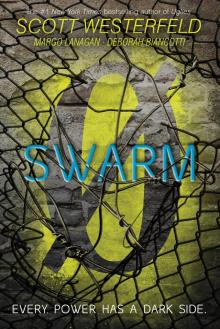 Swarm
Swarm Pretties
Pretties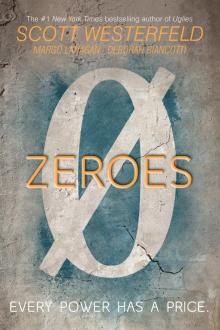 Zeroes
Zeroes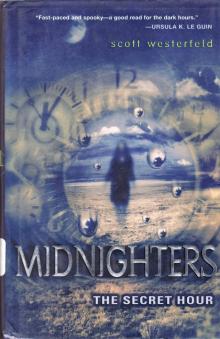 The Secret Hour
The Secret Hour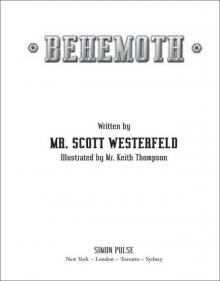 Behemoth
Behemoth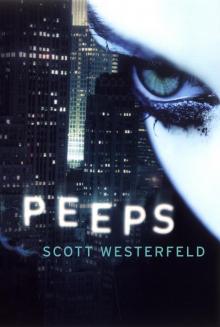 Peeps
Peeps Specials
Specials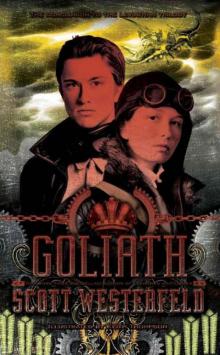 Goliath
Goliath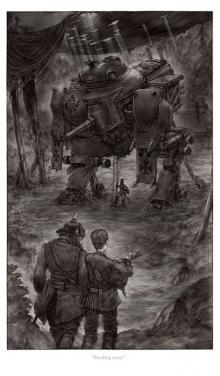 Leviathan
Leviathan Extras
Extras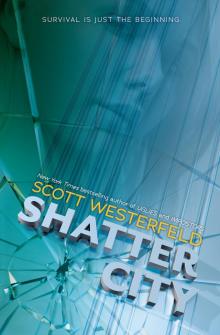 Shatter City
Shatter City The Risen Empire
The Risen Empire Touching Darkness
Touching Darkness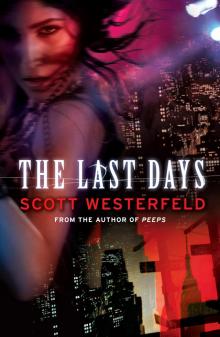 The Last Days
The Last Days So Yesterday
So Yesterday The Killing of Worlds
The Killing of Worlds Afterworlds
Afterworlds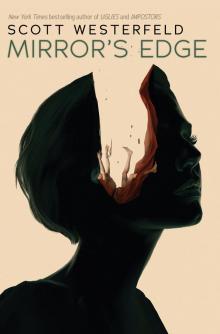 Mirror's Edge
Mirror's Edge Evolution's Darling
Evolution's Darling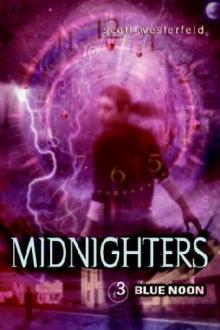 Blue Noon m-3
Blue Noon m-3 Touching Darkness m-2
Touching Darkness m-2 Impostors
Impostors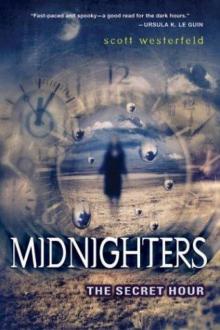 The Secret Hour m-1
The Secret Hour m-1 Leviathan 01 - Leviathan
Leviathan 01 - Leviathan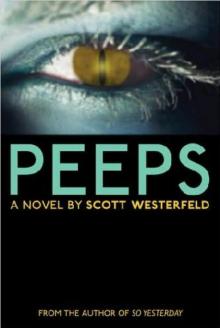 Peeps p-1
Peeps p-1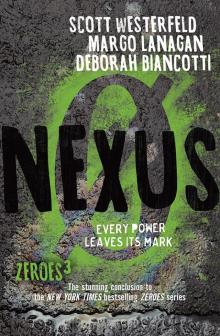 Nexus
Nexus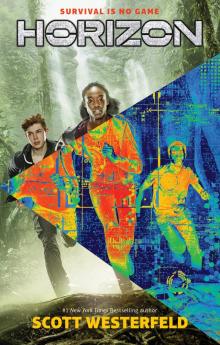 Horizon
Horizon Bogus to Bubbly
Bogus to Bubbly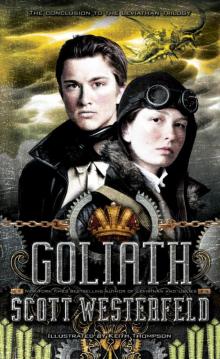 Goliath l-3
Goliath l-3 The Last Days p-2
The Last Days p-2 Behemoth l-2
Behemoth l-2 Stupid Perfect World
Stupid Perfect World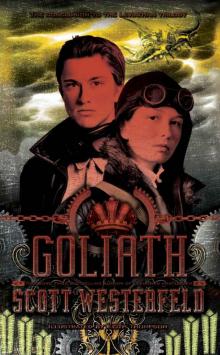 Goliath (Leviathan Trilogy)
Goliath (Leviathan Trilogy)